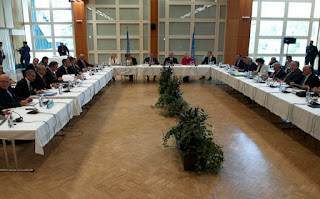The Malaise of being a Greek Today
It wasn’t that difficult to decide, in my current state of mind, that my present and future do not lie in today’s Greece. I thus took the decision to emigrate and move to another city, another country, another university, another work environment where my talents, ideas, and work experience, whatever these might be or are perceived to be, were sought after and appreciated. In the short while that I have left Athens (not even a full month), I feel energized and creative again, full of aspirations, and more committed and hopeful in not only fulfilling my duties and obligations but helping, with the means at my disposal, my country stand on its feet and prosper far more than I have been able since I lived and worked in Greece.
The malaise of being a Greek today is overburdening. It possesses you as a fundamental human necessity – hope – seems to have lost its presence. I hope it is hidden behind a passing cloud or trying to unlock itself from the closet it finds itself imprisoned. If ‘hope is a waking dream’, as Aristotle was reputed to have said; in present day Greece, it is not nowhere near to being awakened.
‘Stay and fight for change like we are doing,’ I heard from many friends, colleagues and students, yet it my beleaguered state of being, the decision to leave was a no-brainer. It allows me to breathe without feeling the uneasiness of putting on a brave face for months to my colleagues at the think tank I used to run as I fought to ensure that their jobs were not at risk. More importantly, I felt I could not face my students at the university for another term with bravado full of empty optimism which I did not believe in. If ‘a leader is a dealer in hope’, I for one as an educator refuse to deal in false hope any longer. A telling example of where we have come in terms of our moral bankruptcy as a society is an incident which I was involved in a few months ago. In one of my weekly flights back and forth to Rhodes in order to teach at my university department, a young stewardess approached me and asked me if I remembered her in an emotional voice barely holding back her tears. She did look very familiar and I could only think that she was former student of mine. She was. She reminded me that I had written her a letter of recommendation to do an MA in International Relations at a UK university a couple of years ago. She was accepted in the programme and received her degree only to return to Greece to find the job market limited that she managed to take the job with the airline because of her foreign language skills. Her pent up emotions upon seeing me, her teacher, personified her crushed aspirations of pursuing a career in a domain she had the intellectual wherewithal to do well and the sad reality of being lucky enough to find a job in order to avoid joining the ranks of the growing unemployed, in particular among her generation. Her parting words were the most crushing – ‘Professor Triantaphyllou, I would have preferred not to have run into you today.’


Comments